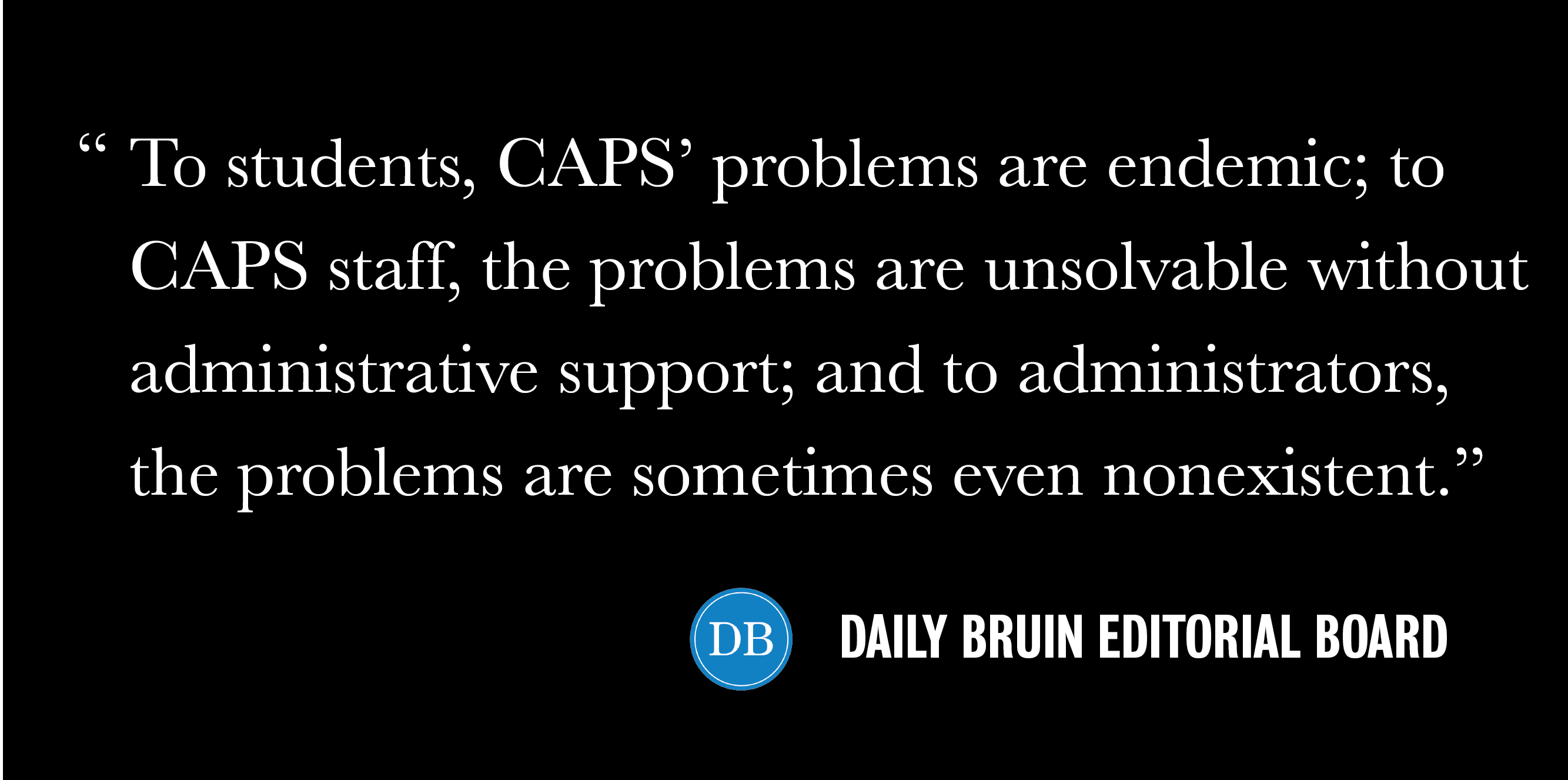Editorial: UCLA administrators are out of touch with mental health services’ limitations

By Editorial Board
March 17, 2019 10:45 p.m.
What is UCLA doing to address its mental health crisis?
When the Daily Bruin Editorial Board met with UCLA’s chancellors and vice chancellors, it sought a straightforward answer to that pressing question.
The response was worse than you think.
UCLA Counseling and Psychological Services’ struggles are a tired refrain at this point: Students aren’t able to form necessary relationships with therapists to be treated effectively because of the ludicrously long wait times and severely limited number of allotted appointments. Those with serious cases are diverted to off-campus resources, while Bruins seeking milder care are triaged to student counseling groups or left to fend for themselves. It doesn’t help that all the while, CAPS has faced precipitous staff turnover amid growing student enrollment.
Administrators last week, however, showed us a startling truth: Nearly every level of UCLA’s mental health system is broken.
Worse, UCLA is willing to discount that reality.
Despite the bevy of problems with CAPS and growing student discontentment with the service, administrators have few satisfactory solutions and seem to lack an understanding of what students want or need from the services.
In the editorial board’s March 11 meeting with administrators and Chancellor Gene Block, for example, Monroe Gorden Jr., vice chancellor of student affairs, denied that CAPS is a short-term care provider and pointed to how it refers students to off-campus resources.
That answer contradicts the messaging of Nicole Green, the executive director of CAPS, who has stressed that CAPS is a short-term mental health facility built to temporarily serve students on a limited budget. Gorden’s statement also disregards that many students do not have the time or resources to travel off campus and that even if students could, they would have to re-establish meaningful connections with therapists.
Moreover, CAPS’ revolving door of mental health professionals also makes it so students are directed to on-campus mental health groups run by other students – hardly a substitute for one-on-one appointments with a professional. When pressed about this crippling retention dilemma, administrators could do little except acknowledge the problem existed.
[Podcast: “In the Know: UCLA’s Counseling Crisis”]
The only option UCLA seems to have on the table is a lofty, long-term proposal to combine facilities like John Wooden Center and CAPS to offer a comprehensive wellness center. While promising, the idea is still being drafted and does not stand to alleviate the university’s debilitating mental health staff turnover.
And that’s the point: For the longest time, the story has been that CAPS has struggled because of administrative disinvestment. The truth is UCLA doesn’t even know how to invest in CAPS.
To students, CAPS’ problems are endemic; to CAPS staff, the problems are unsolvable without administrative support; and to administrators, the problems are sometimes even nonexistent.
It’s no wonder the board’s meeting with the chancellor and his vice chancellors was characterized by eyebrow-raising answers: that students who emailed vice chancellors with their concerns would have them addressed, that CAPS doesn’t have hard limits on the number of allotted appointments and that appointment wait times could be only about two weeks.
Murphy Hall is quite a ways from the campus proper. But it shouldn’t be that far from reality.
Of course, serving a community of UCLA’s size is no small feat, and Block has rightly noted that mental health in the nation needs better solutions beyond one-on-one therapy. Research in UCLA’s Depression Grand Challenge and elsewhere regarding things like online- and artificial intelligence-based treatments could very well shape the trajectory of mental health in this country.
But that’s all akin to science fiction right now – this campus needs immediate solutions. And when students look to CAPS, and CAPS to administrators, we’re only left with vague promises and a lot of misunderstandings.
Providing accessible, on-campus mental health care is expectedly a tall order. At UCLA, though, it’s a pipe dream – one students can’t help but fervently hold onto.


